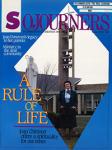A men's group at Sojourners? Where surely the men share cooking, parenting, feelings, and a devotion to the Baltimore Orioles? Maybe starting a men's group took so long because the idea seemed almost too predictable.
It was an idea, like most good ones, that arrived long before its time. For a year or two, some men on the Sojourners staff talked of starting a men's group. There certainly were enough issues and struggles to pull us together: Some were first-time fathers, puzzled by how to help our sons resist the Clint Eastwood model of American manhood and feeling pretty powerless. And others wondered what biblical feminism says to us and confronts in us.
With a bit of envy, several of the men had watched the women on the staff meet regularly to share stories, build friendships and offer support, look critically at the role of women in church and society, and throw parties during the lunch hour.
But a handful of us didn't share this go-to-meeting urge. Some wondered if we would get together only because the women had been meeting. Others stood by their rights under "natural law" to resist the temptation to join a new group or attend yet another meeting.
A few visionaries noted that possibly the most radical stance was not to start a men's group at all, reasoning that the purpose of such support groups is to empower those without access to power, not those born into the dominant group. And a few of us, with some long-term interest but little short-term enthusiasm, decided that when the time was right for a men's group, there would be one.
Then, about three years ago, low-level rumblings began to percolate. Quietly, but quickly, rumors of an impending meeting circulated. Asked furtively in darkened hallways were questions such as, "Are you going to the men's group meeting?" To ease the reluctance of some, a few exchanged promises like school yard blood-brothers at recess: "I'll go to men's group if you go."
But sometime before that uneventful first meeting, most of us decided we shouldn't pass up a chance to get together regularly with the kind of men who work here. Just getting a group of men--even "radical Christian men"--together in a circle without a television tuned to a ball-game can be a breakthrough in itself.
Right from that first gathering, the men's group uncovered its most defining characteristic: None of us were sure why we were there. We took turns talking about why we had come or whether we knew why we had come, what we wanted the group to do or what we wanted it particularly not to do.
FOR THE FIRST SEVERAL weeks, we tried to settle on a direction for the group. Some wanted to start by each of us sharing his life history, with all the members taking a turn. Spending the time to learn about one another could make it easier later to do some honest talking about important issues or experiences. Others, however, preferred to get right to societal or personal issues confronting men, particularly Christian men.
Since those earliest meetings, we've gone back and forth. We've tried one approach for a while, then switched to another, sometimes within a matter of weeks. In addition to alternating agendas, we've scrapped agendas altogether, deciding that for several weeks we'd meet with no agreed topic and discuss whatever people brought to the meeting.
Some of our most fruitful meetings have had planned agendas, as when we discussed racism or the recent Vietnam War film Platoon. And some of our most heartfelt talks were sparked spontaneously, by controversies in the Catholic Church or the effect on a community when members decide to leave. Some of the worst meetings--torturous sessions that kept some away for weeks following--took place at gatherings with either clear topics or no forethought. And some of the deepest insights have produced no answers. But through it all, we remain a group not quite in focus.
For most groups or meetings, a lack of direction would be a symptom of a quick and probably painful disintegration. But the loosely defined vision of the men's group seems to be a source of the group's staying power and appeal.
What is true about this men's group is that its goal has never been to straighten out our political views; its purpose has not been personal improvement, necessarily, or even to be like the women's group. As frustrating as it can be at times, this is a group that doesn't have to "work," that doesn't have to "succeed."
What is true about the men's group is that we hang in there. During the last three years, each of us has wondered at some time why we keep going to meetings, and we've re-evaluated more times than we can remember. But what keeps us, and the group, going is the same feeling that got many of us to sit in on that very first meeting--it's simply too important, and too interesting, to us to know what the others are thinking and feeling.
Joe Lynch was a Sojourners editorial assistant when this article appeared.

Got something to say about what you're reading? We value your feedback!
